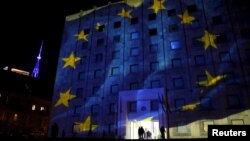Last week, just days after the southern Caucasus nation of Georgia celebrated its newly awarded visa-free travel access to 30 EU countries, Russian news outlets began reporting a different story.
Georgia's visa liberalization wasn't the result of Tblisi's successful, long-planned reforms targeting European integration, Russian outlets said, but part of a seedy quid pro quo that would require the former Soviet republic to build camps for displaced Syrian refugees on its own soil.
The Russian news outlets, along with their pro-Russian counterparts in Georgia, based their claims on one source: German newspaper Bild's interview with Austrian Foreign Minister Sebastian Kurz, who expressed support for the idea of building camps in Georgia and the West Balkans.
"We need refugee centers outside the EU, which are run jointly with the UN refugee agency UNHCR,” said Kurz, without elaborating on exactly where the camps would go.
Denials from both sides
Both EU and Georgian government officials, however, have denied any deal involving refugee camps.
“The distribution of refugees based in EU has never been discussed on an official level," said a statement released by Georgian Foreign Minister Mikheil Janelidze. "Neither had it been raised during Mr. Kurz’s visit to Georgia, or in any other official formats.”
And speaking to Georgian media outlet Netgazeti, Arad Banko, Austrian Ambassador to Georgia, confirmed that building camps in Georgia, although voiced by Kurz, "was never a part of any official discussion.”
Russian state news outlets such as Gazeta.ru, NTV and RT promoted Kurz's comments on refugee encampments, describing them as part of deal for visa-free liberalization.
Some Russian and Georgian lawmakers took it a step further, openly discussing it as an established fact on social media. Russian Duma member Aleksei Pushkov, for example, took to Twitter, where wondered whether Georgia could still deny the EU’s offer.
But a spokesperson for EU Migration Commissioner Dimitris Avramopoulos told VOA's Georgian Service, “The visa liberalization with Georgia is based on a detailed action plan, presented to the Georgian government in 2013, which contains a number of criteria to be fulfilled before visa-free travel is granted in areas such as the rule of law and justice reforms."
"The Commission has been monitoring progress made by the Georgian authorities since the visa liberalization dialogue was launched and concluded in December 2015, that all benchmarks under this Action plan were met," said the EU official. "The fulfillment of the criteria in the Action Plan, and these criteria only, is the basis on which the Commission proposed to grant visa free travel to Georgian citizens for short stays."
Analysts: Visa story part of wider propaganda effort
For Giorgi Meladze, professor of media law at Ilia State University, the disinformation news cycle is a part of a broader propaganda effort orchestrated by the Kremlin and Russia’s intelligence agencies that eventually penetrates Georgian media.
“Russian propaganda is not based on identified propaganda media such as RT, but rather is trying to use well-established, traditional European publications like Bild to enhance anti-western messages," Meladze told VOA. "The aim of disinformation is to portray Europe as an institution undermining Georgia.”
Meladze also worries that Russia is seizing the moment while Western nations are missing strategies to counter Kremlin propaganda.
Donald Jensen, a senior fellow at the Center for European Policy Analysis, tells VOA that blaming the West is a standard Kremlin strategy.
“What is Putin going to do? You blame the West, you invade a country like Ukraine, you use information warfare to pretend Russia has enemies, when it really doesn’t," said Jensen, a former State Department official. "You divert attention; you create external enemies.”
The increase of Russian propaganda inside of Georgia is something international organizations are watching closely.
“The number of online campaigns launched by activists and civil society members has significantly increased over the past years," reads Freedom House’s "Freedom on the Net 2016" report. "However, unreliable and politically biased content, including anti-Western propaganda, also proliferated online.”
European integration
Brussels’ February 28 decision to ratify Georgia's visa liberalization is viewed as a significant geopolitical achievement among officials and civil society activists who have been strong voices for European integration.
Russia, however, has openly expressed concern over Georgia's EU and NATO aspirations, describing the country as part of its backyard. Earlier this month, Russian Foreign Minister Sergei Lavrov told reporters at the Munich Security Conference that security officials from both countries plan to initiate talks on easing visa restrictions soon.
A recent public opinion poll by Caucasus Research and Resources Center showed that 56 percent of Georgians identify as European.
This report was produced in collaboration with VOA's Georgian Service.




